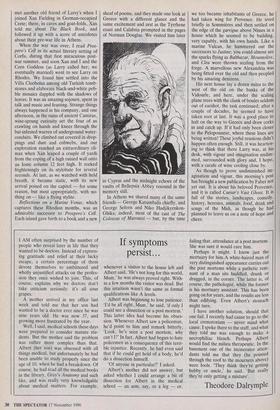If symptoms persist...
I AM often surprised by the number of people who reveal later in life that they wanted to be doctors. Instead of express- ing gratitude and relief at their lucky escape, a certain percentage of them devote themselves to embittered and wholly unjustified attacks on the profes- sion they once wished to join. This, of course, explains why we doctors don't take criticism seriously: it's all sour grapes.
A mother arrived in my office last week and told me that her son had wanted to be a doctor ever since he was nine years old. He was now 37, and growing more frustrated by the year.
Well, I said, medical schools these days were prepared to consider mature stu- dents. But the mother said the problem was rather more complex than that. Albert (her son) was obsessed with all things medical, but unfortunately he had been unable to study properly since the age of 10, when he had a breakdown. Of course, he had read all the medical books in the library, Gray's Anatomy and such like, and was really very knowledgable about medical matters. For example, whenever a visitor to the house left and Albert said, 'He's not long for this world, Mum,' he was always proved right. With- in a few months the visitor was dead. But this intuition wasn't the same as formal qualifications like A levels.
Albert was beginning to lose patience. `I'd be all right, Mum,' he said, if only I could see a dissection or a post mortem.' This latter idea had become his obses- sion. Whenever Albert saw a policeman, he'd point to him and remark bitterly, `Look, he's seen a post mortem, why can't I?' In fact, Albert had begun to hate policemen as a consequence of this terri- ble injustice. Recently, he had even said that if he could get hold of a body, he'd do a dissection himself.
`Of anyone in particular?' I asked.
Albert's mother did not answer, but asked whether I could arrange a bit of dissection for Albert in the medical school — an arm, say, or a leg — or, failing that, attendance at a post mortem. She was sure it would cure him.
Perhaps it might. I know just the mortuary for him.A white-haired man of very distinguished appearance carries out the post mortems while a pathetic rem- nant of a man sits huddled, drunk or drugged, in the corner. The latter is, of course, the pathologist, while the former is his mortuary assistant. This has been going on for years, and the results are less than edifying. Even Albert's stomach might turn.
I have another solution, should that one fail. I recently had cause to go to the local crematorium — never mind what cause. I spoke there to the staff, and what they told me was enough to make a necrophiliac blench. Perhaps Albert would find the milieu therapeutic. In the basement one of the incinerator atten- dants told me that they (he pointed through the roof to the mourners above) were fools. 'They think they're getting hubby or uncle,' he said. 'But really they're only getting a mixture'.
Theodore Dalrymple























































 Previous page
Previous page